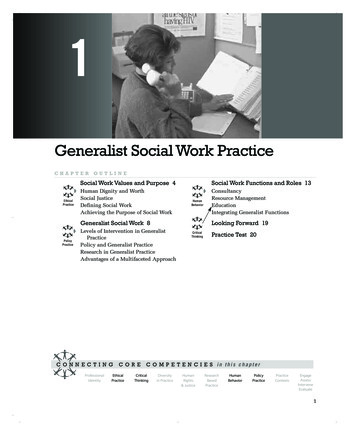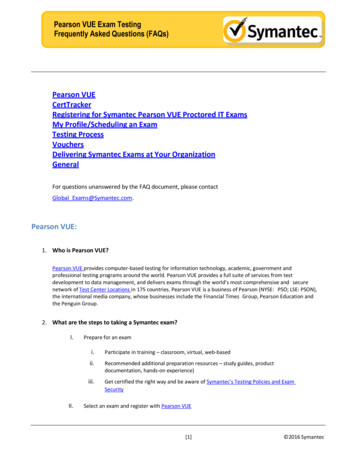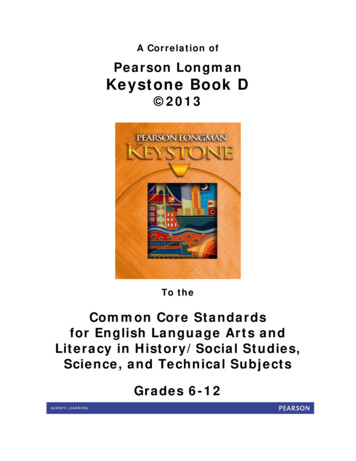
Transcription
M01 MILE9818 07 SE C01.QXD12/7/095:17 PMPage 11FPOGeneralist Social Work PracticeCHAPTER OUTLINESocial Work Values and Purpose 4Social Work Functions and Roles 13 Human Dignity and WorthEthicalPractice Social JusticeDefining Social WorkAchieving the Purpose of Social WorkHumanBehaviorGeneralist Social Work 8Looking Forward 19 Levels of Intervention in GeneralistPracticePolicyPracticePolicy and Generalist PracticeResearch in Generalist PracticeAdvantages of a Multifaceted ApproachC O N N E C T I N GProfessionalIdentityC O R EEthicalPracticeConsultancyResource ManagementEducationIntegrating Generalist FunctionsCriticalThinkingPractice Test 20C O M P E T E N C I E S in this chapterCriticalThinkingDiversityin PracticeHumanRights& 1
M01 MILE9818 07 SE C01.QXD212/4/0910:56 AMPage 2Part I: Social Work Practice Perspectives“What’s working well that you would like to see continue?” With this question,Andrea Barry, a family preservation worker, shifts focus in her work with theClemens family. She carefully studies the reactions to her question on the facesof the family members who are gathered with her around their kitchen table.She reads caution, apprehension, maybe even a little anger, and yes, there it is,a growing sense of surprise, of intrigue with her approach. As a social workerwith the family preservation program of Northside Family Services, Andreahas seen this before. Preparing to fend off the blame of abuse or neglect, families involved with the program are often taken off guard by the careful, nonjudgmental phrasing of her questions. With the query about “what’s workingwell,” Andrea recognizes family strengths and looks toward the future, towardthings families can still do something about. In other words, she sets the stagefor empowering families by focusing on their strengths and promoting theircompetence.Andrea’s question embodies her view of how families might find themselves in this predicament. To continue to focus on “What are your problems?”doesn’t make sense to Andrea, who sees family difficulties arising from thechallenge of scarce resources rather than resulting from something that thefamily is doing wrong. As reflected in her question, Andrea believes that eventhose families referred by the Child Protective Unit for work with the familypreservation program are actually doing a lot right. She regards families asdoing the best they can with currently available resources. So, of course, in trying to overcome their present difficulties, the subsequent question becomes,“What can we do to build on your strengths?” rather than “What else iswrong?” Her approach presumes that all families have strengths and are capable of making changes; it prompts them into collaborating with her as partnersin the change process.Andrea has learned from experience that different families benefit fromdifferent constellations of resources for optimal functioning. Some familymembers need to understand themselves and each other better. Others needinformation about how to cope with the inevitable, and also the unexpected,changes that occur throughout their lives. Often, isolated families benefit fromconnections to the support of interpersonal relationships. Still other familiesneed to access resources from within the community. Andrea teams with families to manage a network of social services, selecting among possibilities ranging from housing assistance to job training to crisis child care to child abuseprevention.Andrea also recognizes the need to broaden her focus, to look beyond theneeds of individual families to serve their best interests. Many times, families,confined by forces they consider to be beyond their personal control, seek a professional voice to speak out for them at the levels of government, policy, andresource allocation. They certainly need power and resources to take charge oftheir own directions in a world that has grown complex and confusing.As Andrea provides opportunities for the Clemens family members torespond to her question, she reminds herself that this family is unique. Sheknows to attend to the ways that her clients are similar as well as to the waysthey are different. As an African American woman, Andrea herself is sensitiveto the confinement of prejudgments. The strengths the Clemens family members have to offer and the challenges they face are particular to their own situation. Demonstrating her cultural competence, Andrea thoughtfully examinesthe assumptions she makes about people based on their obvious similarities soshe will not ignore their inevitable differences.
M01 MILE9818 07 SE C01.QXD12/4/0910:56 AMPage 3Chapter 1: Generalist Social Work Practice3Clients have taught Andrea that individual differences themselves can bethe keys to solutions. Social work practitioners accept the challenge to enableeach client system to access its own unique capabilities and the resources of itsparticular context. Andrea’s role in the professional relationship is that of partner to empower families with their own strengths, not to overpower familieswith her own considerable practice knowledge and skills. Andrea has learnedto depend on each family system’s special competencies to guide her in thisempowering process.Even though Andrea considers the Clemens family as a whole, she willnot neglect her professional mandate to act in the best interest of theClemens children. Ethical considerations and legal obligations compelAndrea to protect the children in this family. However, family service socialworkers simultaneously focus on the preservation of families and the protection of children. Andrea sees the needs of families and children as convergent. What benefits the family will help the children in theirdevelopment. What benefits the children will contribute to the cohesivenessof the family. Theoretically, she sees the whole family system as her clientand knows that any change in the family system will create changes for individual family members.Andrea’s work with the Clemens family reinforces her opinion thatsocial policy that aims to keep families together is good policy. She alwaysfeels best when implementing a policy that reflects a professional philosophy that so neatly fits her own values. The policy of family preservationmakes sense in Andrea’s practice experience, as well. She has observed thetrauma for families and children when children at risk are removed fromtheir own homes. Reuniting them, even after positive changes occur, alwaysseems to be a difficult transition. Research in the field of child welfare confirms Andrea’s practice observations and lends support for the current policy of family preservation. Andrea believes that keeping families togethermakes good economic sense, too. She suspects that economic considerationsare a major force motivating the development of policies that favor familypreservation.“What’s working well that you’d like to see continue?” A simple question,yet it reflects Andrea Barry’s empowerment orientation toward social workpractice. Andrea has learned that even simple questions can have dramaticeffects. Simple questions set the tone, bond relationships, and lead to successful solutions.This chapter provides an overview of social work practice. It describes theunderlying values, purposes, and perspectives that contribute to the empowering approach that Andrea Barry uses and explains what generalist social workers do. Specifically, this chapter Articulates the value base and purpose of the social work profession Defines generalist social work as an integration of practice, policy, andresearch Explains social work intervention activities at each system level ofpractice—micro-, mezzo-, and macrolevel, and the social work profession Differentiates the multiple functions and roles of generalist social workersat various system levelsThe outcome is a foundation on which to build an understanding of socialwork practice from a generalist perspective.
M01 MILE9818 07 SE C01.QXD412/4/0910:56 AMPage 4Part I: Social Work Practice PerspectivesSOCIAL WORK VALUES AND PURPOSEEthicalPracticeHuman dignity andworth and social justiceare the centerpiece values of the social workprofession. How arethese professionalvalues reflected in thedefinition of humanrights?Andrea Barry practices in family services—one of many fields of social work.Other practice arenas include school social work, medical social work, probation and other criminal justice services, mental health, youth services, childwelfare, and housing and urban development, to name a few. The predominantfields of social work practice, representing more than 70% of the professionalworkforce, are mental health, medical health, child welfare, and aging services(NASW, 2005a).All social work practitioners, regardless of their particular field of practice,share a common professional identity and work toward similar purposes. TheNational Association of Social Workers (1999a), in its Code of Ethics, definesthis unifying purpose, or mission, of all social work as “to enhance humanwell-being and help meet the basic human needs of all people, with particularattention to the needs and empowerment of people who are vulnerable,oppressed, and living in poverty” (Preamble). To meet this purpose, socialworkers recognize that private troubles and public issues are intertwined.Thus, social workers strive to both strengthen human functioning and promote the effectiveness of societal structures. This simultaneous focus on persons and their environments permeates all social work practice. As a socialworker, Andrea Barry works with the Clemens family to facilitate the adaptivefunctioning of their family and preserve their unity. She also works to create aresource-rich and responsive environment that will contribute to the development and stability of the Clemens family. Both of these activities reflectAndrea’s integration of the fundamental values of the social work profession.The overarching values of human dignity and worth and social justice shapeher attitudes; the purpose of the profession directs her actions.Human Dignity and WorthValuing the inherent human dignity and worth of all people reflects a nondiscriminatory view of humankind. The Code of Ethics (1999a) charges socialworkers to “treat each person in a caring and respectful fashion, mindful of individual differences and cultural and ethnic diversity,” “. . . promote clients’socially responsible self-determination,” “. . . enhance clients’ capacity andopportunity to change and to address their own needs,” and “. . . resolve conflicts between clients’ interests and the broader society’s interests in a sociallyresponsible manner” (Preamble). Similarly, in their joint statement on ethics insocial work, the International Federation of Social Workers (IFSW) and theInternational Association of Schools of Social Work (IASSW) affirm that humanrights follow from respect for the inherent dignity and worth of all people. Assuch, social workers are expected to defend and uphold the physical, psychological, emotional, and spiritual integrity and well-being of all persons by1. Respecting the right to self-determination–Social workers shouldrespect and promote people’s right to make their own choices anddecisions, irrespective of their values and life choices, provided thisdoes not threaten the rights and legitimate interests of others.2. Promoting the right to participation–Social workers should promotethe full involvement and participation of people using their servicesin ways that enable them to be empowered in all aspects of decisionsand actions affecting their lives.
M01 MILE9818 07 SE C01.QXD12/4/0910:56 AMPage 5Chapter 1: Generalist Social Work Practice53. Treating each person as a whole–Social workers should be concernedwith the whole person, within the family, community, societal andnatural environments, and should seek to recognise all aspects of aperson’s life.4. Identifying and developing strengths–Social workers should focus onthe strengths of all individuals, groups and communities and thuspromote their empowerment. (IFSW, 2004, Sec. 4.1)Respectful interaction with others affirms their sense of dignity and worth.Social workers treat people with consideration, respect their uniqueness,appreciate the validity of their perspectives, and listen carefully to what theyhave to say. Ultimately, according people dignity and worth affords them theopportunities and resources of a just society.Social JusticeCharity begins at homeand justice begins nextdoor.—Charles DickensSocial justice refers to the manner in which society distributes resourcesamong its members. “Social justice prevails when all members of a societyshare equally in the social order, secure an equitable consideration of resourcesand opportunities, and enjoy their full benefit of civil liberties” (DuBois &Miley, 2008, p. 16). The IFSW and the IASSW (2004) detail the fabric of socialjustice:1. Challenging negative discrimination–Social workers have a responsibility to challenge negative discrimination on the basis of characteristics such as ability, age, culture, gender or sex, marital status,socio-economic status, political opinions, skin colour, racial or otherphysical characteristics, sexual orientation, or spiritual beliefs.2. Recognising diversity–Social workers should recognise and respectthe ethnic and cultural diversity of the societies in which they practise, taking account of individual, family, group and community differences.3. Distributing resources equitably–Social workers should ensure thatresources at their disposal are distributed fairly, according to need.4. Challenging unjust policies and practices–Social workers have a dutyto bring to the attention of their employers, policy makers, politiciansand the general public situations where distribution of resources, policies and practices are oppressive, unfair or harmful.5. Working in solidarity–Social workers have an obligation to challengesocial conditions that contribute to social exclusion, stigmatisation orsubjugation, and to work towards an inclusive society. (Sec. 4.2)Social injustice prevails when society infringes on human rights, holds prejudicial attitudes toward some of its members, and institutionalizes inequality by discriminating against segments of its citizenry. Encroachments onhuman and civil rights deny equal access to opportunities and resources,limiting full participation in society. Collectively, the injustices enacted byadvantaged groups create conditions of discrimination and oppression fordisadvantaged groups. Members of oppressed groups often personally experience dehumanization and victimization. Social workers understand theconsequences of injustice and intervene to achieve individual and collectivesocial and economic justice.
M01 MILE9818 07 SE C01.QXD612/4/0910:56 AMPage 6Part I: Social Work Practice PerspectivesDefining Social WorkSocial work is a profession that supports individuals, groups, and communities in a changing society and creates social conditions favorable to the wellbeing of people and society. The International Federation of Social Work(IFSW) defines social work:The social work profession promotes social change, problem solving inhuman relationships and the empowerment and liberation of people toenhance well-being. Utilizing theories of human behaviour and socialsystems, social work intervenes at the points where people interact withtheir environments. Principles of human rights and social justice are fundamental to social work. (IFSW, 2000)Similarly, the Council on Social Work Education (CSWE), which accreditsundergraduate and graduate social work programs, describes the purpose ofsocial work:The purpose of the social work profession is to promote human and community well-being. Guided by a person and environment construct, aglobal perspective, respect for human diversity, and knowledge based onscientific inquiry, social work’s purpose is actualized through its questfor social and economic justice, the prevention of conditions that limithuman rights, the elimination of poverty, and the enhancement of thequality of life for all persons. (CSWE, 2008, p. 1)Framing social work’s commitment to respect for the dignity and worth all people and the profession’s quest for social justice, the core values of social workalso set the standards for what is desirable in practice. The National Association of Social Workers Code of Ethics (1999a) describes the professional valuesthat guide social work practice: Service: helping people and solving social problemsSocial justice: challenging injusticesDignity and worth of the person: respecting inherent dignityImportance of human relationships: recognizing the importance ofbelongingness Integrity: being trustworthy Competence: practicing competentlyAchieving the Purpose of Social WorkSocial work focuses on releasing human power in individuals to reach theirpotential and contribute to the collective good of society; it emphasizes releasingsocial power to create changes in society, social institutions, and social policy,which in turn create opportunities for individuals (Smalley, 1967). This viewconceptualizes the purpose of social work in relation to both individual and collective resources. The trademark of the social work profession is this simultaneous focus on persons and their impinging social and physical environments.To this end, practitioners work with people in ways that strengthen theirsense of competence, link them with needed resources, and promote organizational and institutional change so that the structures of society respond to theneeds of all societal members (NASW, 1981). Additionally, social workers engagein research to contribute to social work theory and evaluate practice methods. Toachieve these purposes, social workers engage in a variety of activities.
M01 MILE9818 07 SE C01.QXD12/4/0910:56 AMPage 7Chapter 1: Generalist Social Work Practice7Box 1.1 The Ethic of JusticeSocial justice describes circumstances in which allmembers of a society have equal access to societal resources, opportunities, rights, political influence,and benefits (Barker, 2003; Finn & Jacobson, 2003;Healy, 2001; Parker, 2003; Pease, 2002). Social justice prevails when all members benefit from theresources that a society offers and, reciprocally, haveopportunities to contribute to that society’s pool ofresources. In contrast, social injustice is evident whena society denies certain population groups civil rightsby excluding them from full participation in decisionmaking, when it distributes institutional resources indeference to privilege and power, or when its members show prejudicial attitudes and discriminatoryactions toward each other.The philosophy of social justice is deeply rooted inthe social work profession; however, political realitiesand ethical dilemmas confound workers’ attempts toapply the principles of social justice in practice. As anexample, Reisch (2002) describes problems associated with relating social justice principles to the socialpolicy debates taking place in today’s political andeconomic environment.Two fundamental problems are often overlooked, however, in discussions of applying justice principles tocontemporary social policy debates. The first is theparadox of attempting to develop principles of justicewithin a political, economic, and social context basedlargely, if tacitly, on the preservation of injustice. . . .The second problem relates to the application of justice concepts based largely on the expansion of individual rights and individual shares of societalresources to the development of policies, programs,and modes of intervention that address group needsand concerns. (pp. 346–347)Reisch highlights the tension between asserting individual rights and advancing the common good in allocating societal resources. Group and individualinterests do not always converge. Social workers facedilemmas in choosing actions in practice that promotea social justice ideal.Despite competing values, privileged interests, ethical contradictions, and political realities, social workethics compels workers to promote social justice andchallenge injustices through social change, particularlyin their efforts with the most vulnerable groups in society. Empowerment-based practice principles alsodemand that workers address injustice and inequalityas they affect all practice domains, processes, andactivities. “Part of what is involved in becomingempowered is that people are not cowed into hopelessness and inaction by these existing inequalities.Thus is empowerment intrinsically linked to fightingagainst oppression and social justice” (Breton, 2002,p. 26). Guaranteeing access to services, the opportunity to experience social and economic privilege, anawareness of due process, a voice in policy formulationand implementation, and the power to influenceresource allocation—all are trademarks of justice-centered and empowerment-based social work practice.Social workers further the social justice ideal byexpanding institutional resources such as adequateeducation, political participation, and economic selfsufficiency. Justice-centered workers also strive to promote fair health, education, employment, and socialwelfare policies and to organize social service deliverynetworks for client access, respect, and acceptance.Ensuring people equal access affirms human dignityand worth and creates an environment reflective of ajust society.First, social work practitioners engage with clients to assess challenges insocial functioning, process information in ways that enhance their ability todiscover solutions, develop skills to resolve problems in living, and create support for change.Second, social workers link people with resources and services, a vital strategy in any change effort. More than simply connecting people with services,workers advocate optimal benefits, develop networks of communication amongorganizations in the social service delivery network, and establish access toresources. When necessary resources do not exist, practitioners generate newopportunities, programs, and services.Third, the NASW charges practitioners to work toward a humane and adequate social service delivery system. To accomplish this, social workers champion
M01 MILE9818 07 SE C01.QXD812/4/0910:56 AMPage 8Part I: Social Work Practice Perspectivesthe planning of pertinent programs by advocating client-centeredness, coordination, effectiveness, and efficiency in the delivery of services. Importantly, theystrengthen lines of accountability and ensure the application of professional standards, ethics, and values in service delivery.Fourth, social workers participate in social policy development. In thearena of social policy, workers analyze social problems for policy ramifications, develop new policies, and retire those that are no longer productive.They also translate statutes, policies, and regulations into responsive programsand services that meet individual and collective needs.Finally, practitioners engage in research to further the knowledge and skillbase of social work. Effective and ethical social work depends on practitioners using research-based theory and methods as well as contributing to theknowledge base of the profession through their own research and evaluationactivities.GENERALIST SOCIAL WORKPolicyPracticeGeneralist social workerspractice in the context ofpersonal and collectiveissues. Why is policypractice importantto their work in directpractice?Generalist social work provides an integrated and multileveled approach formeeting the purposes of social work. Generalist practitioners acknowledge theinterplay of personal and collective issues, prompting them to work with avariety of human systems—societies, communities, neighborhoods, complexorganizations, formal groups, families, and individuals—to create changes thatmaximize human system functioning. This means that generalist social workers work directly with client systems at all levels, connect clients to availableresources, intervene with organizations to enhance the responsiveness ofresource systems, advocate just social policies to ensure the equitable distribution of resources, and research all aspects of social work practice.The generalist approach to social work practice rests on four majorpremises. First, human behavior is inextricably connected to the social andphysical environment. Second, based on this linkage among persons and environments, opportunities for enhancing the functioning of any human systeminclude changing the system itself, modifying its interactions with the environment, and altering other systems within its environment. Generalist practitioners implement multilevel assessments and multimethod interventions inresponse to these possible avenues for change. Third, work with any level of ahuman system—from individual to society—uses similar social workprocesses. Social work intervention with all human systems requires anexchange of information through some form of dialogue, a process of discoveryto locate resources for change, and a phase of development to accomplish thepurposes of the work. Finally, generalist practitioners have responsibilitiesbeyond direct practice to work toward just social policies as well as to conductand apply research.Levels of Intervention in Generalist PracticeGeneralist social workers look at issues in context and find solutions withinthe interactions between people and their environments. The generalistapproach moves beyond the confines of individually focused practice to theexpansive sphere of intervention at multiple system levels. “In this process, allsocial work methods—traditional and innovative—are utilized, singly or incombination, to meet reality needs and to alleviate stresses in ways thatenhance or strengthen the inherent capacities of client systems” (Brown, 1982,
M01 MILE9818 07 SE C01.QXD12/4/0910:56 AMPage 9Chapter 1: Generalist Social Work Practice9p. 123). In generalist social work, the nature of presenting situations, the particular systems involved, and potential solutions shape interventions, ratherthan a social worker’s adherence to a particular method.The view of generalist social work is like the view through a wide-anglelens of a camera. It takes in the whole, even when focusing on an individualpart. Workers assess people in the backdrop of their settings, and interventionsunfold with an eye to outcomes at all system levels. Visualize potential clientsand agents for change on a continuum ranging from micro- to mezzo- tomacrolevel interventions, small systems to large systems, including the systemof the social work profession itself (Figure 1.1). Generalist social workers viewproblems in context, combine practice techniques to fit the situation, andimplement skills to intervene at multiple system levels.Working with microlevel systemsMicrolevel intervention focuses on work with people individually, in families, orin small groups to foster changes within personal functioning, in social relationships, and in the ways people interact with social and institutional resources.Social workers draw on the knowledge and skills of clinical practice, includingstrategies such as crisis intervention, family therapy, linkage and referral, and theuse of group process. For instance, in this chapter’s introductory example,Andrea Barry could work with Mr. and Mrs. Clemens to improve their parentingskills or refer them to a parent support group.Although microlevel interventions create changes in individual, familial,and interpersonal functioning, social workers do not necessarily direct all theirefforts at changing individuals themselves. Often, workers target changes inother systems, including changes in the social and physical environments, tofacilitate improvement in an individual’s or family’s social functioning. Theseactivities involve work with systems at other levels.Working with mezzolevel systemsMezzolevel intervention creates changes in task groups, teams, organizations, andthe network of service delivery. In other words, the locus for change is within organizations and formal groups, including their structures, goals, or functions. Forexample, if, in working with the Clemens children, Andrea learns of their embarrassment at receiving lunch subsidies because the school physically segregatesthe “free lunch” students from the “full pay” students in the cafeteria, she canhelp them and otherfamilies who reportsimilar concerns byMicrolevel InterventionsIndividuals, Families,focuses onand Small Groupsworking directly onthe school’s policy.Andrea’s work withOrganizations and Formal GroupsMezzolevel Interventionsfocuses onthe school to addressthis demeaning anddiscriminatory pracCommunities and SocietiesMacrolevel Interventionsfocuses ontice represents a mezzolevel intervention.Effecting change inorganizations requiresSocial Work ProfessionSocial Work Profession Interventions focuses onan understanding ofgroup dynamics, skillsFigure 1.1in facilitating decisionSystem Levels for Social Work Intervention
M01 MILE9818 07 SE C01.QXD12/4/091010:56 AMPage 10Part I: Social Work Practice Perspectivesmaking, and a proficiency in organizational planning. Working with agency structures and the social service delivery network is essential for developing qualityresources and services.Working with macrolevel systemsMacrolevel intervention addresses social problems in community, institutional,and societal systems. At this level, generalist practitioners work to achieve socialchange through neighborhood organizing, community planning, locality development, public education, policy development, and social action. A worker’s testimony at a legislative hearing reflects a macrolevel strategy to support acomprehensive national family welfare policy. Working with neighborhoodgroups to lobby f
Andrea's integration of the fundamental values of the social work profession. The overarching values of human dignity and worthand social justiceshape her attitudes; the purpose of the profession directs her actions. Human Dignity and Worth Valuing the inherent human dignity and worth of all people reflects a nondis-criminatory view of humankind.










